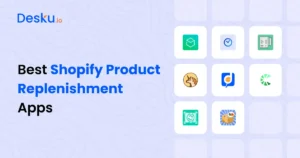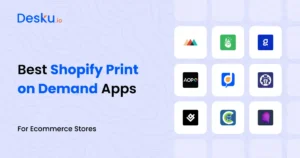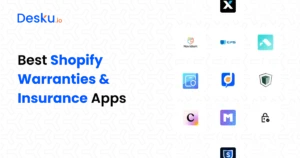Pricing is one of the most critical factors in whether customers will buy from you or your competitors. In the world of ecommerce, where shoppers can compare prices with just a few clicks, keeping your prices competitive is crucial. But how do you ensure that your prices aren’t too high (driving customers away) or too low (cutting into your profits)? That’s where competitive pricing apps come in.
These apps automatically track your competitors’ pricing strategies, letting you know when and how to adjust your prices. Whether you run a small online shop or manage a large ecommerce operation, using a competitive pricing tool can help boost your profits and sales.
In this article, we’ll walk you through 8 of the best competitive pricing apps that ecommerce store owners can use to stay ahead in the market. From simple monitoring tools to advanced AI-powered platforms, we’ll help you choose the one that fits your business needs.
There are over 7,000 Shopify Plus stores globally, used by enterprise-level businesses. (source)
What is Competitive Pricing and Why It Matters
Competitive pricing is all about setting your product prices based on what your competitors are charging. In ecommerce, it’s essential because shoppers have easy access to price comparison tools and can quickly jump to a competitor’s site if your prices are higher. To stay competitive, businesses need a strategic approach that considers the prices of similar products in the market.
Here are a few key reasons why competitive pricing matters in ecommerce:
- Customer Expectations: Online shoppers expect to get the best deal. If your prices are significantly higher than your competitors, they will likely look elsewhere, resulting in lost sales.
- Profit Maximization: Competitive pricing tools help you find the perfect balance between profitability and competitiveness. These apps allow you to track competitor prices in real-time, helping you make data-driven decisions on when to raise or lower prices.
- Market Positioning: Using a competitive pricing strategy also helps you position your brand in the market. For instance, you might decide to offer premium products at higher prices or become a budget-friendly option in your niche. Competitive pricing tools help you understand where you stand relative to competitors.
- Price Sensitivity: Knowing how sensitive customers are to price changes allows you to adjust your strategy accordingly. Some products may need frequent price changes to remain competitive, while others may only require occasional tweaks.
By using competitive pricing apps, ecommerce businesses can analyze their competitors’ pricing strategies, get insights into market trends, and automatically adjust their prices without manually monitoring the competition.
Top 08 Competitive Pricing Apps for Ecommerce
1. Prisync

Prisync is an online pricing tool designed to monitor competitor prices and provide dynamic pricing suggestions. It is ideal for ecommerce businesses that want to stay competitive without manually tracking prices.
Key Features:
- Competitor price tracking
- Dynamic pricing suggestions
- API access for seamless integrations
- Stock availability monitoring
- Customizable email alerts for price changes
Pros:
- Excellent for tracking prices across multiple competitors
- Easy to set up and integrate with ecommerce platforms
- Customizable alerts help you stay on top of price changes
Cons:
- The interface can feel overwhelming with too many features for smaller businesses
- Higher-tier plans can get expensive
Pricing:
- Starts at $99/month with a 14-day free trial
Rating:
- 4.6/5
User Review:
“Prisync is a game-changer for our ecommerce business. We now adjust prices based on real-time competitor data, which has helped increase our sales significantly.”
2. Price2Spy

Price2Spy is a robust competitor price monitoring tool designed for businesses that need real-time price tracking and dynamic repricing. It caters to businesses of all sizes and offers a wide range of pricing plans.
Key Features:
- Real-time price monitoring
- Competitor insights and dynamic pricing rules
- Price elasticity analysis
- Email alerts and dashboard summaries
- Reporting features
Pros:
- Real-time monitoring and comprehensive competitor data
- Easy to set up with customizable reporting
- Affordable pricing, especially for small businesses
Cons:
- Basic features in the standard plan may not be enough for larger companies
- The interface can be slow at times
Pricing:
- Starts at $19.95/month
Rating:
- 4.5/5
User Review:
“We’ve been using Price2Spy for over a year, and it’s been extremely helpful in adjusting our prices dynamically. The ability to monitor both competitors and stock levels is a huge bonus.”
3. Repricer

Repricer is specifically designed for marketplace sellers (Amazon and eBay) and automates repricing to help win the Buy Box. It’s a must-have tool for sellers who want to remain competitive on these platforms.
Key Features:
- Automated repricing for Amazon and eBay
- Competitor price analysis
- Real-time price adjustments
- Customizable pricing rules
Pros:
- Excellent for increasing Buy Box win rate on Amazon
- Saves time with automated pricing adjustments
- Highly customizable rules for pricing
Cons:
- Limited to Amazon and eBay platforms
- Pricing is higher compared to other tools
Pricing:
- Starts at $75/month
Rating:
- 4.3/5
User Review:
“Our sales have increased significantly since using Repricer for our Amazon listings. It’s easy to set up, and the automated price adjustments have taken a huge burden off our team.”
4. PriceMole

PriceMole is designed for tracking competitor prices and automating pricing strategies. It includes customizable widgets to compare your store’s prices with competitors directly on your site.
Key Features:
- Automated competitor price monitoring.
- Dynamic repricing based on custom rules.
- Historical pricing charts and revenue reports.
- Customizable competitor price comparison widget.
Pros:
- User-friendly interface.
- Historical price tracking helps with long-term strategy.
- Strong customer support.
Cons:
- Higher price points for larger stores.
- Limited number of competitors and products in the lower pricing plans.
Pricing: Starts at $99/month
Rating: 4.8/5
User Review:
“The support team is top-notch, and the app works like a charm. We’ve increased our profits by simply keeping up with our competitors’ pricing.”
5. Intelis AI Dynamic Pricing

Intelis offers AI-powered dynamic pricing, enabling Shopify store owners to automate price adjustments based on competitor data and market trends.
Key Features:
- AI-driven dynamic pricing suggestions.
- Real-time competitor price adjustments.
- Ability to set different price points for specific products and categories.
Pros:
- Leverages machine learning for better pricing.
- Easy integration with Shopify stores.
- Helps optimize profit without losing competitiveness.
Cons:
- Limited customization for smaller businesses.
- Pricing plans may be costly for startups.
Pricing: Starts at $39/month
Rating: 4.6/5
User Review:
“Intelis has transformed the way we price our products. The AI does an incredible job of adjusting prices automatically based on competitor data.”
6. Pricefy

Pricefy is a comprehensive price monitoring and adjustment app that allows Shopify store owners to track competitors and set dynamic prices.
Key Features:
- Automated price tracking and repricing.
- Real-time price alerts for competitor changes.
- Price comparison reports and analytics.
Pros:
- Simple and easy to set up.
- Alerts help stay on top of market changes.
- Provides valuable insights for pricing strategy.
Cons:
- Limited features in the free version.
- May not suit large businesses with complex pricing needs.
Pricing: Free plan available; premium starts at $49/month
Rating: 4.7/5
User Review:
“Pricefy keeps us competitive by alerting us to price drops and allowing us to adjust quickly. A must-have for any serious Shopify store owner.”
7. NA Bulk Price Editor

NA Bulk Price Editor is perfect for store owners who need to update product prices in bulk. It simplifies the process by allowing you to change prices across collections, products, and vendors all at once.
Key Features:
- Bulk price updates by percentage or flat rate.
- Schedule sales and price adjustments in advance.
- CSV import for mass price updates.
Pros:
- Extremely efficient for stores with large inventories.
- Allows scheduled price changes for sales events.
- Great for time-saving.
Cons:
- Limited to bulk price updates, lacks dynamic competitor tracking.
- Advanced features locked behind the premium plan.
Pricing: Starts at $19.95/month
Rating: 4.9/5
User Review:
“We use NA Bulk Price Editor to manage seasonal price changes. It’s a lifesaver when running flash sales.”
8. Intelligence Node

Intelligence Node uses AI-driven insights to help ecommerce businesses track competitor prices and make data-backed pricing decisions. With its strong focus on automation and analytics, it’s ideal for businesses looking to take their pricing strategies to the next level.
Key Features:
- Automated price monitoring
- AI-powered pricing insights
- Competitor stock tracking
- Integration with ecommerce platforms
Pros:
- Advanced AI-driven insights for smarter pricing
- Automated competitor price tracking
- Great for large-scale ecommerce businesses
Cons:
- Can be expensive for smaller companies
- The interface may be too complex for beginners
Pricing:
- Custom pricing based on business requirements
Rating:
- 4.5/5
User Review:
“Intelligence Node has streamlined our pricing process. The AI-driven insights are incredibly accurate and have helped us make data-backed decisions that improve profitability.”
FAQ Section
What is dynamic pricing, and how can it benefit my ecommerce store?
Dynamic pricing is a strategy where the price of a product is automatically adjusted based on market conditions, such as competitor prices, demand, or inventory levels. By using dynamic pricing, ecommerce stores can ensure their products are always competitively priced, helping them increase sales while maintaining profitability. For example, you might lower prices when demand is low or raise them when stock levels are limited. Many competitive pricing tools, like Prisync and Competera, offer dynamic pricing features to automate these adjustments.
How often should I adjust my prices using competitive pricing tools?
The frequency of price adjustments depends on your industry and the type of products you sell. If you’re in a highly competitive market, like electronics or fashion, frequent adjustments may be necessary—sometimes even daily. Tools like Price2Spy and Repricer allow you to set automatic price changes based on real-time competitor data, helping you stay competitive without constantly monitoring prices yourself. However, for other industries, weekly or even monthly adjustments may be enough
What happens if my competitors are also using these tools?
If your competitors are using similar pricing tools, it could lead to frequent price changes, often called a “race to the bottom.” This can be avoided by setting minimum price thresholds or using other strategies such as value-based pricing, where you emphasize the unique benefits of your products instead of focusing solely on price. Apps like Omnia Retail and Minderest provide advanced insights that help you make smarter pricing decisions, even in competitive markets where others are also automating their prices.
Can these pricing tools be integrated with ecommerce platforms like Shopify?
Yes, many competitive pricing tools offer direct integration with popular ecommerce platforms like Shopify, WooCommerce, and Magento. For example, Prisync offers a Shopify app that syncs competitor pricing data with your store’s product listings. These integrations simplify the process of adjusting prices and tracking competitors directly from your ecommerce dashboard, saving time and reducing manual work.
What’s the difference between price monitoring and dynamic pricing?
Price monitoring involves tracking competitor prices to gather data and understand market trends. It doesn’t automatically adjust your prices but provides insights for you to make pricing decisions. Dynamic pricing, on the other hand, automatically adjusts your prices in real-time based on certain triggers, such as competitor price changes or fluctuations in demand. Many tools, like Price2Spy and Intelligence Node, offer both features, allowing businesses to monitor prices and dynamically adjust them as needed.
Are competitive pricing tools worth it for small ecommerce businesses?
Yes, competitive pricing tools can benefit small businesses by allowing them to stay competitive without spending a lot of time manually tracking competitor prices. Some tools, like Price2Spy, offer affordable plans starting at $19.95/month, making it accessible even for smaller operations. These tools can help increase sales by ensuring your prices remain competitive, ultimately driving more traffic to your store.
Can I use these tools to monitor international competitors?
Yes, many pricing tools like Skuuudle and Minderest are designed to track competitors across global marketplaces. This is particularly useful for ecommerce businesses selling internationally, as you can monitor price fluctuations in different regions and adjust your strategy accordingly.
Conclusion
Choosing the right competitive pricing tool can have a significant impact on the success of your ecommerce business. Whether you are a small online shop trying to stay competitive or a large retailer managing prices across multiple markets, these apps can save time and optimize your pricing strategy.
From Prisync‘s real-time competitor tracking to Intelligence Node‘s AI-driven insights, each tool offers unique features that can fit various business needs. The key is to evaluate your specific goals—whether it’s to automate pricing adjustments, gather competitive intelligence, or optimize prices across global markets. Using the right tool will help you make smarter pricing decisions, increase profitability, and stay ahead of your competition.
In the fast-paced world of ecommerce, it’s crucial to adapt quickly. With the help of these tools, you can ensure that your store remains competitive while maximizing profit.









